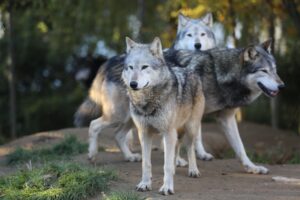Case study: Grey Wolf phylogeography
Case Study: Phylogeography of Grey Wolves (Canis lupus)
The gray wolf (Canis lupus) provides a fascinating example of how phylogeography can illuminate the complex evolutionary history and demographic changes of a species. As a widely distributed carnivore with populations across North America, Europe, and Asia, the gray wolf has undergone significant fluctuations in range and abundance due to both natural and anthropogenic factors.

Historical Context
The gray wolf’s global range has contracted significantly over the past few centuries due to habitat loss, hunting, and persecution. However, during the last glacial maximum (LGM), they were widespread across the Northern Hemisphere. The glaciers acted as a physical barrier, driving isolation and genetic differentiation between Eurasian and North American populations.
Genetic Analysis and Findings
Recent phylogeographic studies have used mitochondrial DNA (mtDNA) and nuclear microsatellites to reveal patterns of genetic diversity and divergence across different populations. Researchers found that:
- European and Asian wolf populations form a distinct lineage from North American wolves, indicating a long period of isolation.
- Within North America, wolves exhibit regional genetic structure due to historical ice barriers and local adaptation.
- Wolves in Alaska and western Canada have retained ancient genetic lineages from the Pleistocene epoch.
- Wolves in the western United States, recolonizing after extirpation in the 20th century, have lower genetic diversity and reflect a relatively recent genetic bottleneck.
Implications for Conservation
These findings have significant implications for conservation. Regional populations possess unique genetic characteristics that should be preserved. For instance, the European populations represent a distinct lineage with a limited distribution. In North America, efforts should focus on maintaining genetic diversity among remaining wolf populations while facilitating connectivity across fragmented habitats.
Media Attributions
- wolves © Ronnie Macdonald is licensed under a CC BY (Attribution) license

